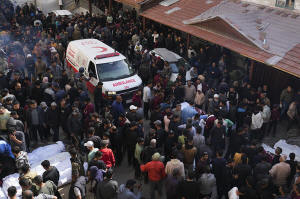Israeli strikes across Gaza kill at least 326 Palestinians and shatter
ceasefire with Hamas
[March 18, 2025]
By WAFAA SHURAFA, JOSEF FEDERMAN and SAMY MAGDY
DEIR AL-BALAH, Gaza Strip (AP) — Israel launched airstrikes across the
Gaza Strip early Tuesday, killing at least 326 Palestinians, including
women and children, according to hospital officials. The surprise
bombardment shattered a ceasefire in place since January and threatened
to fully reignite the 17-month-old war.
Prime Minister Benjamin Netanyahu ordered the strikes after Hamas
refused Israeli demands to change the ceasefire agreement. Officials
said the operation was open-ended and was expected to expand. The White
House said it had been consulted and voiced support for Israel's
actions.
The Israeli military ordered people to evacuate eastern Gaza, including
much of the northern town of Beit Hanoun and other communities further
south, and head toward the center of the territory, indicating that
Israel could soon launch renewed ground operations.
“Israel will, from now on, act against Hamas with increasing military
strength,” Netanyahu’s office said.
The attack during the Muslim holy month of Ramadan could resume a war
that has already killed tens of thousands of Palestinians and caused
widespread destruction across Gaza. It also raised questions about the
fate of the roughly two dozen Israeli hostages held by Hamas who are
believed to still be alive.
A senior Hamas official said Netanyahu’s decision to return to war
amounts to a “death sentence” for the remaining hostages. Izzat al-Risheq
accused Netanyahu of launching the strikes to try and save his far-right
governing coalition and called on mediators to “reveal facts” on who
broke the truce. Hamas said at least four senior officials were killed
in Tuesday's strikes.

There were no reports of any attacks by Hamas several hours after the
bombardment, indicating it still hoped to restore the truce.
The strikes came as Netanyahu comes under mounting domestic pressure,
with mass protests planned over his handling of the hostage crisis and
his decision to fire the head of Israel's internal security agency. His
latest testimony in a long-running corruption trial was canceled after
the strikes.
The main group representing families of the captives accused the
government of backing out of the ceasefire, saying it “chose to give up
on the hostages.”
“We are shocked, angry and terrified by the deliberate dismantling of
the process to return our loved ones from the terrible captivity of
Hamas,” the Hostages and Missing Families Forum said in a statement.
Wounded stream into Gaza hospitals
A strike on a home in the southern city of Rafah killed 17 members of
one family, including at least 12 women and children, according to the
European Hospital, which received the bodies. The dead included five
children, their parents, and another father and his three children.
In the southern city of Khan Younis, Associated Press reporters saw
explosions and plumes of smoke. Ambulances brought wounded people to
Nasser Hospital, where patients lay on the floor, some screaming. A
young girl cried as her bloody arm was bandaged.
Many Palestinians said they had expected a return to war when talks over
the second phase of the ceasefire did not begin as scheduled in early
February. Israel instead embraced an alternative proposal and cut off
all shipments of food, fuel and other aid to the territory's 2 million
Palestinians to try to pressure Hamas to accept it.
“Nobody wants to fight,” Palestinian resident Nidal Alzaanin told the AP
by phone from Gaza City. "Everyone is still suffering from the previous
months,” he said.
Gaza's Health Ministry said at least 326 people were killed in the
strikes and hundreds more wounded. Rescuers were still searching the
rubble for dead and wounded as the strikes continued. It was among the
deadliest days of the war.
U.S. backs Israel and blames Hamas
The White House sought to blame Hamas for the renewed fighting. National
Security Council spokesman Brian Hughes said the militant group "could
have released hostages to extend the ceasefire but instead chose refusal
and war.”
An Israeli official, speaking on condition of anonymity to discuss the
unfolding operation, said Israel was striking Hamas' military, leaders
and infrastructure and planned to expand the operation beyond air
attacks. The official accused Hamas of attempting to rebuild and plan
new attacks. Hamas militants and security forces quickly returned to the
streets in recent weeks after the ceasefire went into effect.

[to top of second column]
|

Mourners gather around the bodies of Palestinians who were killed in
an Israeli army airstrikes as they are brought to Al-Ahli Hospital
in Gaza City, Tuesday, March 18, 2025. (AP Photo/Abdel Kareem Hana)

A second Israeli official, who also spoke on condition of anonymity
to discuss a closed-door meeting, said Netanyahu would meet with top
security officials to discuss next steps in the war.
Talks on a second phase of the ceasefire had stalled
The strikes came two months after a ceasefire was reached to pause
the war. Over six weeks, Hamas released 25 Israeli hostages and the
bodies of eight more in exchange for nearly 2,000 Palestinian
prisoners in a first phase of the ceasefire.
But since that ceasefire ended two weeks ago, the sides have not
been able to agree on a way forward with a second phase aimed at
releasing the 59 remaining hostages, 35 of whom are believed to be
dead, and ending the war altogether.
Hamas has demanded an end to the war and full withdrawal of Israeli
troops in exchange for the release of the remaining hostages. Israel
says it will not end the war until it destroys Hamas' governing and
military capabilities and frees all hostages — two goals that could
be incompatible.
Netanyahu's office on Tuesday said Hamas had “repeatedly refused to
release our hostages and rejected all offers it received from the
U.S. presidential envoy, Steve Witkoff, and from the mediators.”
Israel wants Hamas to release half of the remaining hostages in
return for a promise to negotiate a lasting truce. Hamas instead
wants to follow the ceasefire deal reached by the two sides, which
calls for negotiations to begin on the ceasefire’s more difficult
second phase, in which the remaining hostages would be released and
Israeli forces would withdraw from Gaza.
A return to war would allow Netanyahu to avoid the tough trade-offs
called for in the second phase of the agreement and the thorny
question of who would govern Gaza. It would also shore up his
coalition, which depends on far-right lawmakers who want to
depopulate Gaza and re-build Jewish settlements there.
Gaza already was in a humanitarian crisis
The war erupted when Hamas-led militants stormed into southern
Israel on Oct 7, 2023, killing some 1,200 people, mostly civilians,
and taking 251 hostages. Most have been released in ceasefires or
other deals, with israeli forces rescuing only eight and recovering
dozens of bodies.
Israel responded with a military offensive that killed over 48,000
Palestinians, according to local health officials, and displaced an
estimated 90% of Gaza's population. The territory's Health Ministry
doesn't differentiate between civilians and militants, but says over
half of the dead have been women and children.

The ceasefire had brought some relief to Gaza and allowed hundreds
of thousands of displaced Palestinians to resume to what remained of
their homes.
Netanyahu faces mounting criticism
The released hostages, some of whom were emaciated, have repeatedly
implored the government to press ahead with the ceasefire to return
all remaining captives. Tens of thousands of Israelis have taken
part in mass demonstrations calling for a ceasefire and return of
all hostages.
Mass demonstrations are planned later Tuesday and Wednesday
following Netanyahu's announcement this week that he wants to fire
the head of Israel's Shin Bet internal security agency. Critics have
lambasted the move as an attempt by Netanyahu to divert blame for
his government's failures in the Oct. 7 attack and handling of the
war.
Since the ceasefire in Gaza began in mid-January, Israeli forces
have killed dozens of Palestinians who the military says approached
its troops or entered unauthorized areas.
Still, the deal has tenuously held without an outbreak of wide
violence. Egypt, Qatar and the United States have been trying to
mediate the next steps in the ceasefire.
___
Federman reported from Jerusalem and Magdy from Cairo. Associated
Press reporters Mohammad Jahjouh in Khan Younis, Gaza Strip; Abdel
Kareem Hana in Gaza City, Gaza Strip; Fatma Khaled in Cairo; and Tia
Goldenberg in Tel Aviv, Israel, contributed.
All contents © copyright 2025 Associated Press. All rights reserved |